The leaders of the 189-nation International Monetary Fund and its sister organization, the World Bank, are laying out their visions for the future, hoping to achieve a world with less extreme poverty and more economic growth.
However, IMF Managing Director Kristalina Georgieva and World Bank President David Malpass will likely find their discussions over the next two days consumed with more immediate problems, such as rising trade tensions that have sapped world growth.
Both officials will deliver speeches at the opening session Friday of the annual meetings of the two organizations. Also Friday, Japanese Finance Minister Taro Aso will meet with reporters at the end of discussions among finance ministers and central bank governors from the Group of 20 major industrial nations.
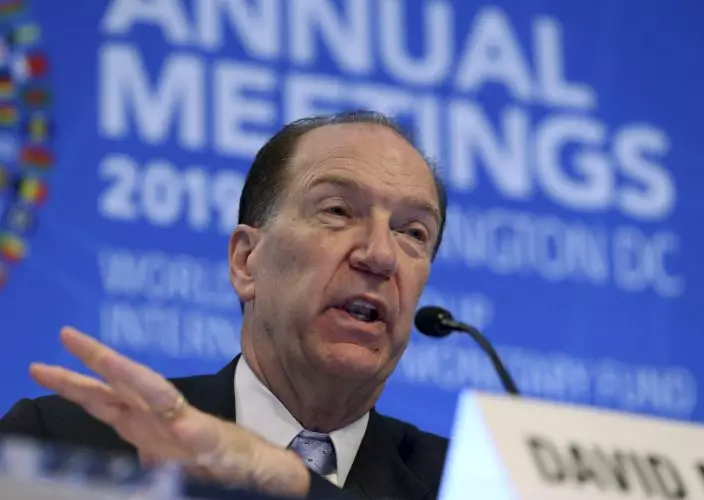
World Bank President David Malpass speaks during a news conference at the World BankIMF Annual Meetings in Washington, Thursday, Oct. 17, 2019. (AP PhotoJose Luis Magana)
All the meetings, which are scheduled to conclude Saturday, are expected to be dominated by debate over the best way to cool rising trade tensions, which have seen the world's two biggest economies, the United States and China, impose punitive tariffs on billions of dollars of each other's exports.
The U.S.-China trade war has had ripple effects that have contributed to a significant, synchronized slowdown across 90% of the globe.
Meeting with reporters Thursday, Georgieva said a tentative U.S.-China trade agreement announced last week by President Donald Trump should lessen slightly the damage done by the trade war — but until the two nations resolved their differences, it would not remove enough uncertainty to return the globe to solid growth.
Georgieva said the tariffs still being imposed would result in 0.6% in lost global output by the end of 2020, down a bit from the 0.8% in lost output the IMF had initially estimated.
But she said that result was not good enough and what was needed was for the United States and China to resolve all their trade issues and for all countries to work together to modernize the rules of global trade to lessen friction in the future.
"Our hope is to move from a trade truce to a trade peace," she told reporters.
The IMF released an updated economic outlook Tuesday that projected global growth for this year at 3%. That would be the weakest showing since a negative 0.1% in 2009, in the wake of the worst financial crisis since the 1930s.
Georgieva, a Bulgarian economist who had held the No. 2 job at the World Bank, was tapped last month to take over at the IMF, succeeding Christine Lagarde.
In her news conference Thursday, she said she hoped this week's talks would focus on ways to ease trade tensions and begin the groundwork to update the rules of world trade. The Trump administration has repeatedly attacked the Geneva-based World Trade Organization, saying it is biased against the United States.
"We have been reaching agreements on trade based primarily on the past," she said. She noted that global commerce has been transformed in recent years by advances in technology, and those advances need to be acknowledged in new trade rules.
Malpass, who took over as head of the World Bank earlier this year, said his focus for the meetings will be efforts to ensure that everything possible is done to restart global growth, given that the 700 million people living in extreme poverty — one in 12 people on the planet — will be the most harmed by a prolonged slowdown.
"There is an urgency to what we're doing because of the challenges facing development," Malpass said. "Global growth is slowing, investment is sluggish, manufacturing activity is soft and trade is weakening."
In his announcement last week, Trump said he was suspending a tariff increase on $250 billion of Chinese products that had been scheduled to take effect this week.
Treasury Secretary Steven Mnuchin told reporters Wednesday that the U.S. and Chinese negotiators were working to hammer out details on this "phase one" agreement.
He said he and U.S. Trade Representative Robert Lighthizer would speak by phone with Chinese Vice Premier Liu He, the head of the Chinese negotiating team, next week and planned to meet with him in Santiago, Chile, before the Asia Pacific Economic Cooperation leaders' summit on Nov. 16-17.
It is expected that Trump and Chinese President Xi Jinping will meet at that summit to sign the initial phase of the deal, if it is finalized by that time.
Mnuchin said the administration has made no decision yet on whether it will postpone 15% tariffs on $160 billion in Chinese goods still due to take effect Dec. 15.
UNITED NATIONS (AP) — The United States vetoed a widely backed U.N. resolution Thursday that would have paved the way for full United Nations membership for Palestine, a goal the Palestinians have long sought and Israel has worked to prevent.
The vote in the 15-member Security Council was 12 in favor, the United States opposed and two abstentions, from the United Kingdom and Switzerland. U.S. allies France, Japan and South Korea supported the resolution.
The strong support the Palestinians received reflects not only the growing number of countries recognizing their statehood but almost certainly the global support for Palestinians facing a humanitarian crisis caused by the war in Gaza, now in its seventh month.
The resolution would have recommended that the 193-member U.N. General Assembly, where there are no vetoes, approve Palestine becoming the 194th member of the United Nations. Some 140 countries have already recognized Palestine, so its admission would have been approved, likely by a much higher number of countries.
U.S. deputy ambassador Robert Wood told the Security Council that the veto “does not reflect opposition to Palestinian statehood but instead is an acknowledgment that it will only come from direct negotiations between the parties."
The United States has “been very clear consistently that premature actions in New York — even with the best intentions — will not achieve statehood for the Palestinian people,” deputy State Department spokesman Vedant Patel said.
His voice breaking at times, Palestinian U.N. Ambassador Riyad Mansour told the council after the vote: “The fact that this resolution did not pass will not break our will and it will not defeat our determination.”
“We will not stop in our effort,” he said. “The state of Palestine is inevitable. It is real. Perhaps they see it as far away, but we see it as near.”
This is the second Palestinian attempt for full membership and comes as the war in Gaza has put the more than 75-year-old Israeli-Palestinian conflict at center stage.
Palestinian President Mahmoud Abbas first delivered the Palestinian Authority’s application for U.N. membership in 2011. It failed because the Palestinians didn’t get the required minimum support of nine of the Security Council’s 15 members.
They went to the General Assembly and succeeded by more than a two-thirds majority in having their status raised from a U.N. observer to a non-member observer state in 2012. That opened the door for the Palestinian territories to join U.N. and other international organizations, including the International Criminal Court.
Algerian U.N. Ambassador Amar Bendjama, the Arab representative on the council who introduced the resolution, called Palestine’s admission “a critical step toward rectifying a longstanding injustice" and said that “peace will come from Palestine’s inclusion, not from its exclusion.”
In explaining the U.S. veto, Wood said there are “unresolved questions” on whether Palestine meets the criteria to be considered a state. He pointed to Hamas still exerting power and influence in the Gaza Strip, which is a key part of the state envisioned by the Palestinians.
Wood stressed that the U.S. commitment to a two-state solution, where Israel and Palestine live side-by-side in peace, is the only path for security for both sides and for Israel to establish relations with all its Arab neighbors, including Saudi Arabia.
“The United States is committed to intensifying its engagement with the Palestinians and the rest of the region, not only to address the current crisis in Gaza, but to advance a political settlement that will create a path to Palestinian statehood and membership in the United Nations,” he said.
Mansour, the Palestinian U.N. ambassador, reiterated the commitment to a two-state solution but asserted that Israel believes Palestine "is a permanent strategic threat."
"Israel will do its best to block the sovereignty of a Palestinian state and to make sure that the Palestinian people are exiled away from their homeland or remain under its occupation forever,” he said.
He demanded of the council and diplomats crowded in the chamber: “What will the international community do? What will you do?”
Israeli-Palestinian negotiations have been stalled for years, and Israel’s right-wing government is dominated by hard-liners who oppose Palestinian statehood.
Israeli U.N. Ambassador Gilad Erdan called the resolution “disconnected to the reality on the ground” and warned that it “will cause only destruction for years to come and harm any chance for future dialogue.”
Six months after the Oct. 7 attack by the Hamas militant group, which controlled Gaza, and the killing of 1,200 people in “the most brutal massacre of Jews since the Holocaust,” he accused the Security Council of seeking “to reward the perpetrators of these atrocities with statehood.”
Israel’s military offensive in response has killed over 32,000 Palestinians, according to Gaza’s health ministry, and destroyed much of the territory, which speaker after speaker denounced Thursday.
After the vote, Erdan thanked the United States and particularly President Joe Biden “for standing up for truth and morality in the face of hypocrisy and politics.”
He called the Palestinian Authority — which controls the West Bank and the U.S. wants to see take over Gaza where Hamas still has sway — “a terror supporting entity.”
The Israeli U.N. ambassador referred to the requirements for U.N. membership – accepting the obligations in the U.N. Charter and being a “peace-loving” state.
“How can you say seriously that the Palestinians are peace loving? How?” Erdan asked. “The Palestinians are paying terrorists, paying them to slaughter us. None of their leaders condemns terrorism, nor the Oct. 7 massacre. They call Hamas their brothers.”
Despite the Palestinian failure to meet the criteria for U.N. membership, Erdan said most council members supported it.
“It’s very sad because your vote will only embolden Palestinian rejectionism every more and make peace almost impossible,” he said.
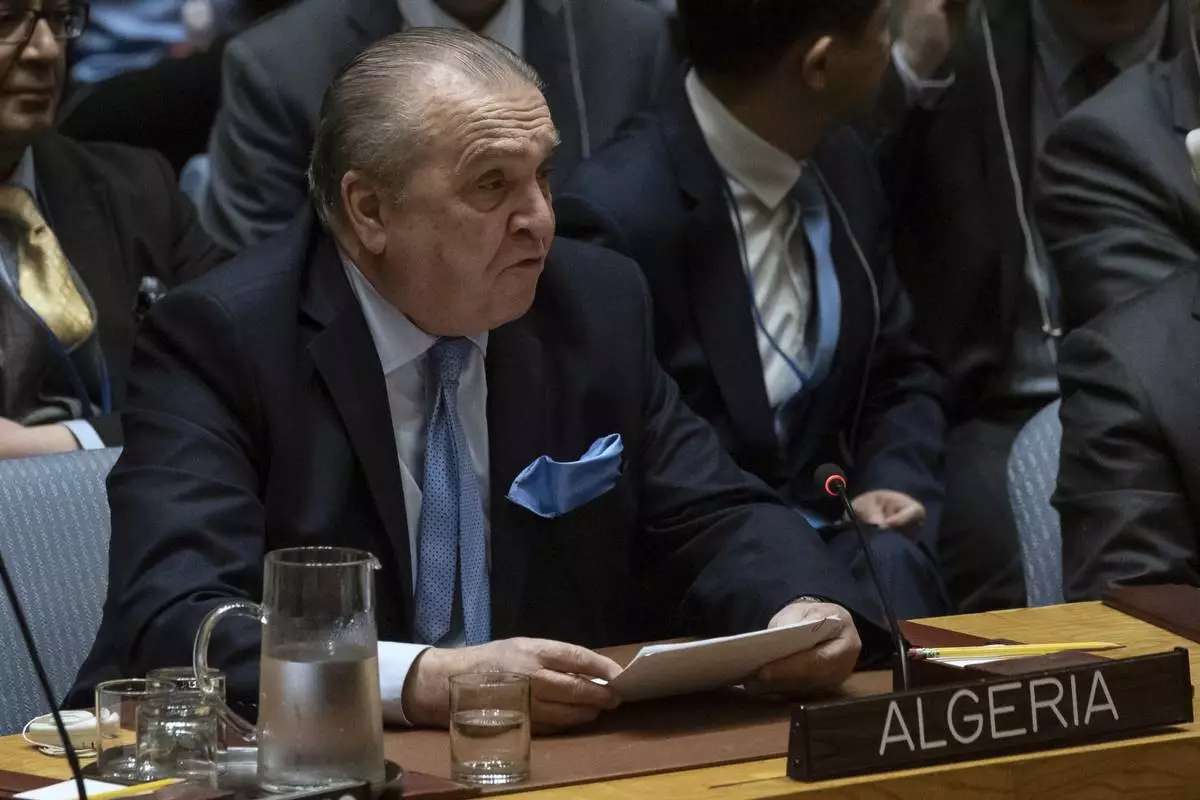
Algeria's Permanent Ambassador to the United Nations Amar Bendjama speaks during a Security Council meeting at United Nations headquarters, Thursday, April 18, 2024. (AP Photo/Yuki Iwamura)
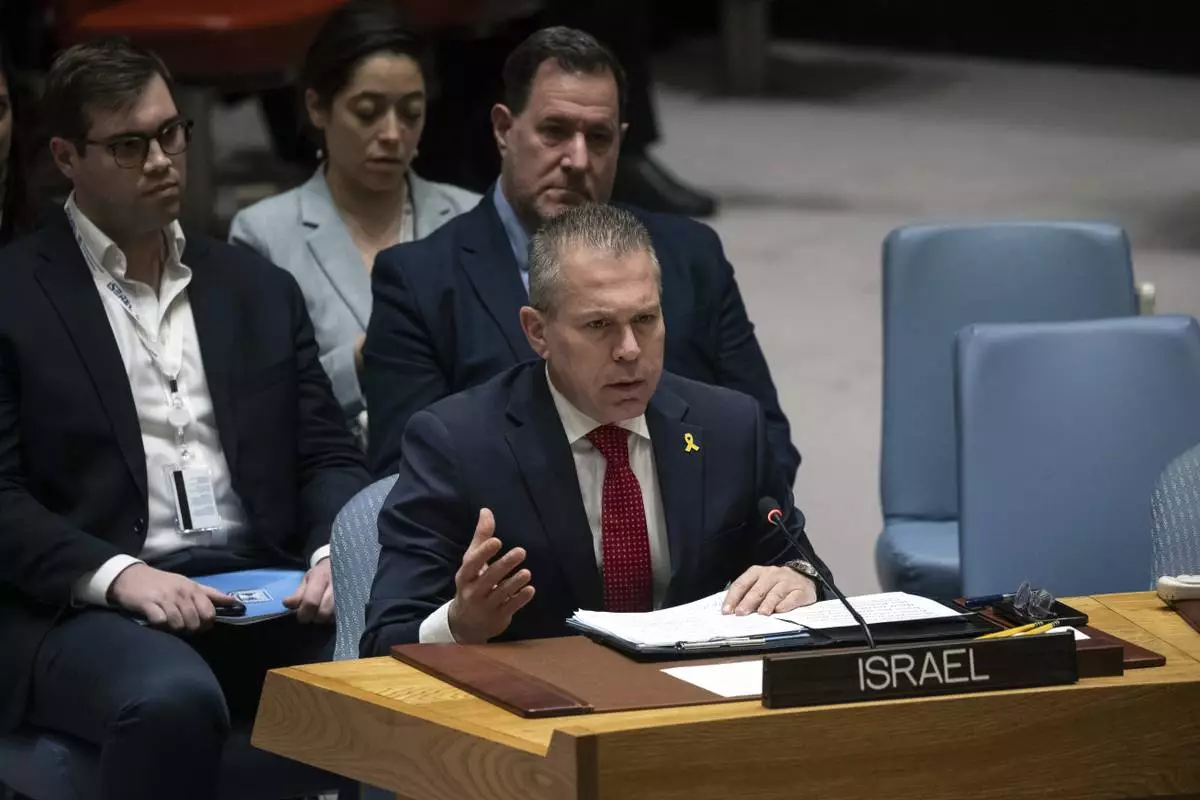
Israeli Ambassador to the United Nations Gilad Erdan speaks during a Security Council meeting at United Nations headquarters, Thursday, April 18, 2024. (AP Photo/Yuki Iwamura)
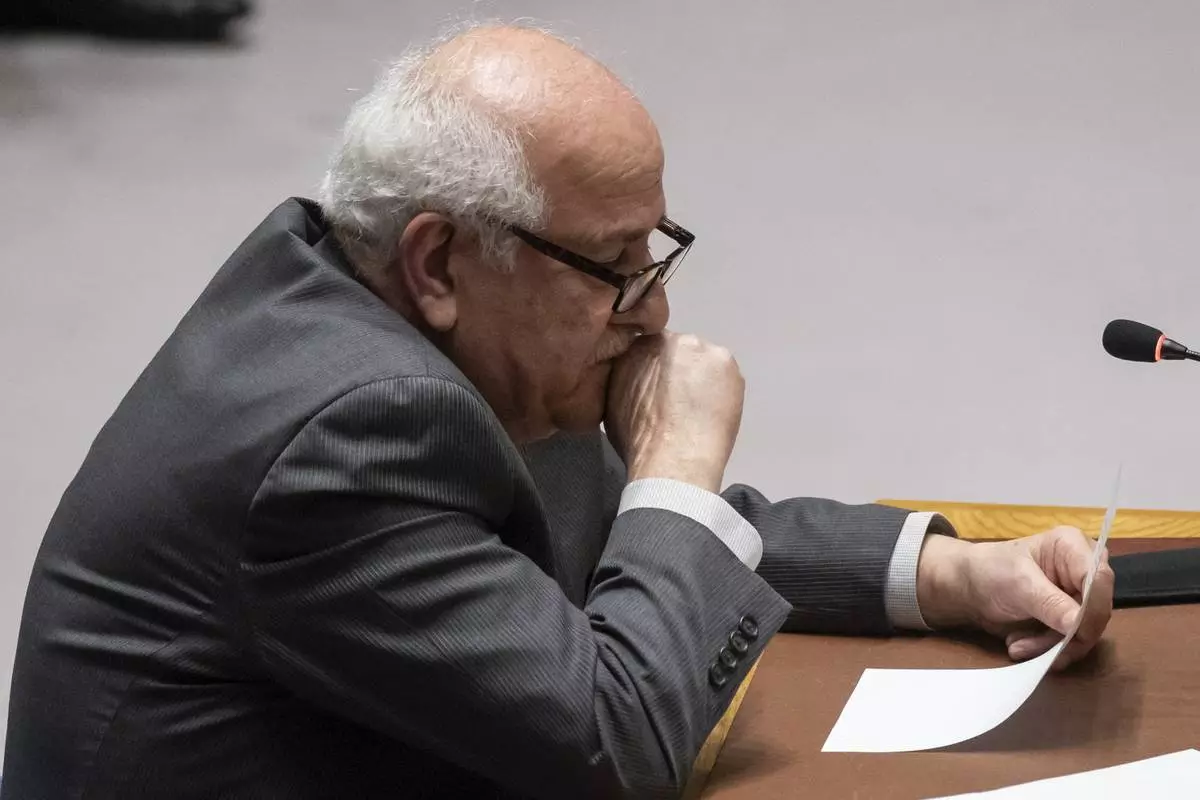
Palestinian Ambassador to the United Nations Riyad Mansour holds tears while speaking during a Security Council meeting at United Nations headquarters, Thursday, April 18, 2024. (AP Photo/Yuki Iwamura)
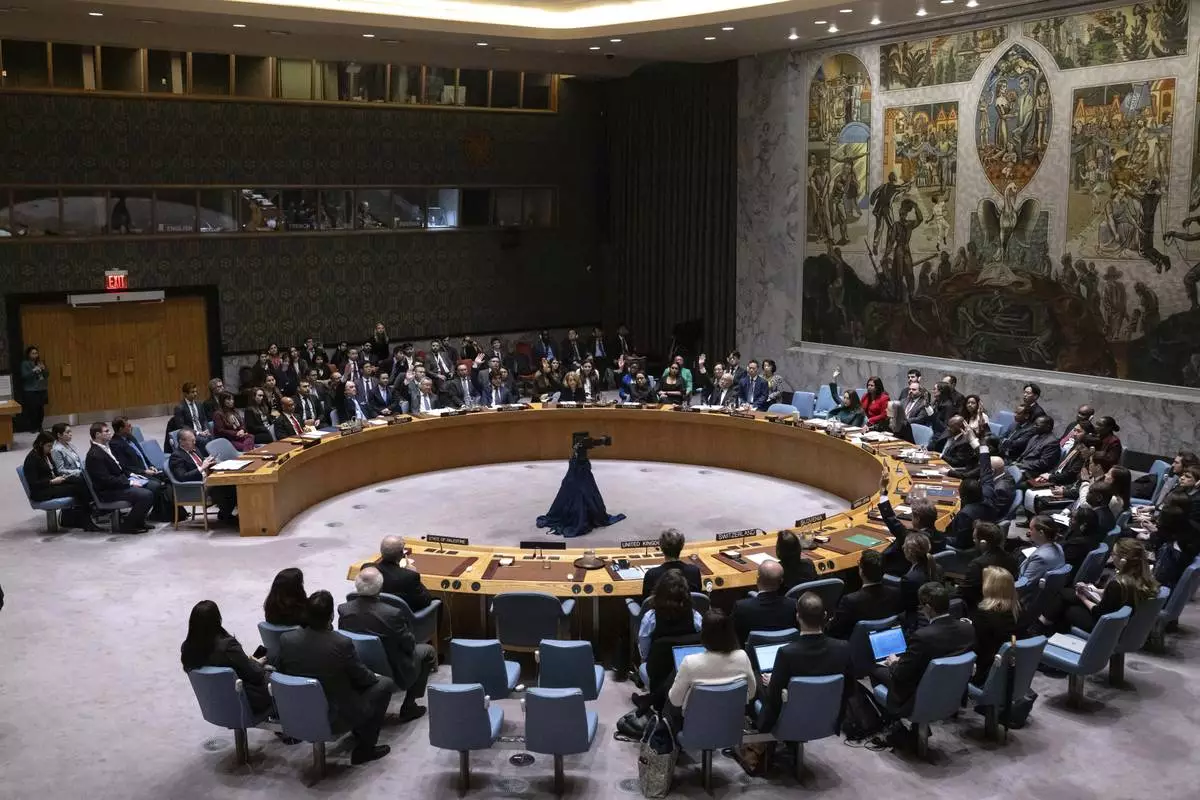
Representatives of member countries take votes during a Security Council meeting at United Nations headquarters, Thursday, April 18, 2024. (AP Photo/Yuki Iwamura)
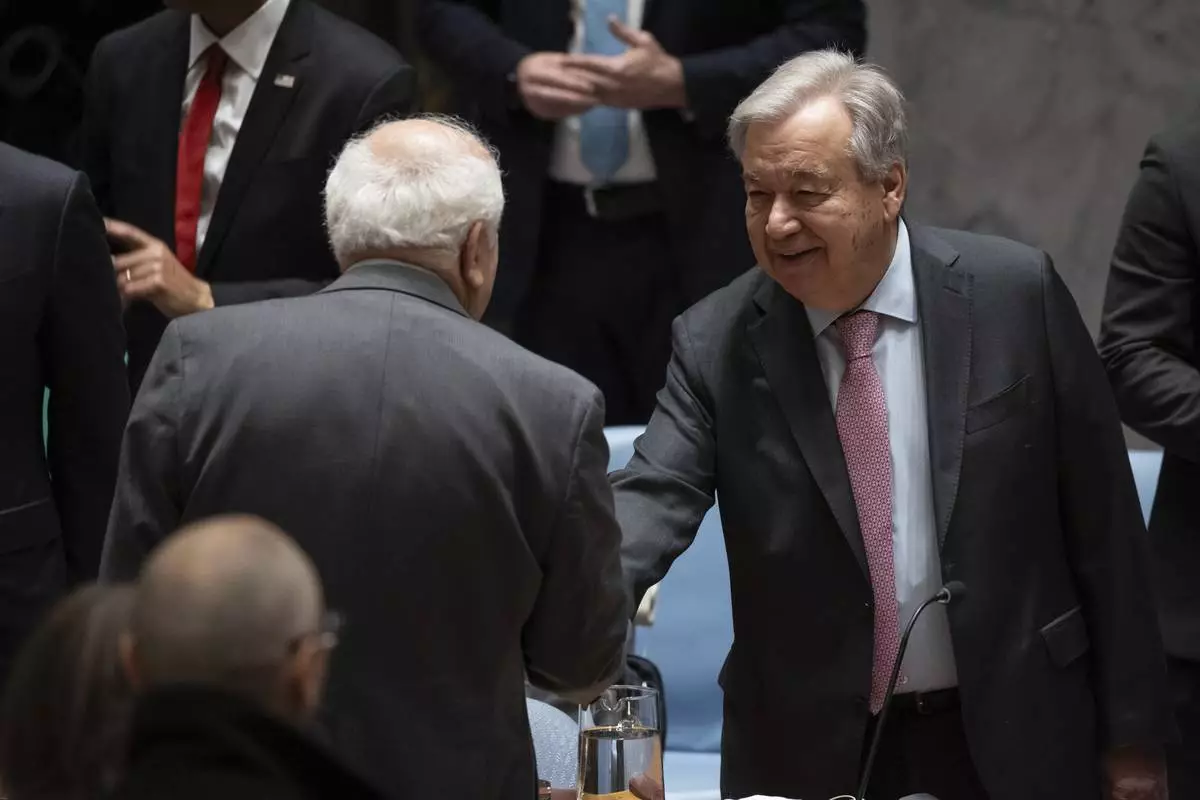
Palestinian Ambassador to the United Nations Riyad Mansour, left, and United Nations Secretary-General Antonio Guterres speak before a Security Council meeting at the United Nations headquarters, Thursday, April 18, 2024. (AP Photo/Yuki Iwamura)
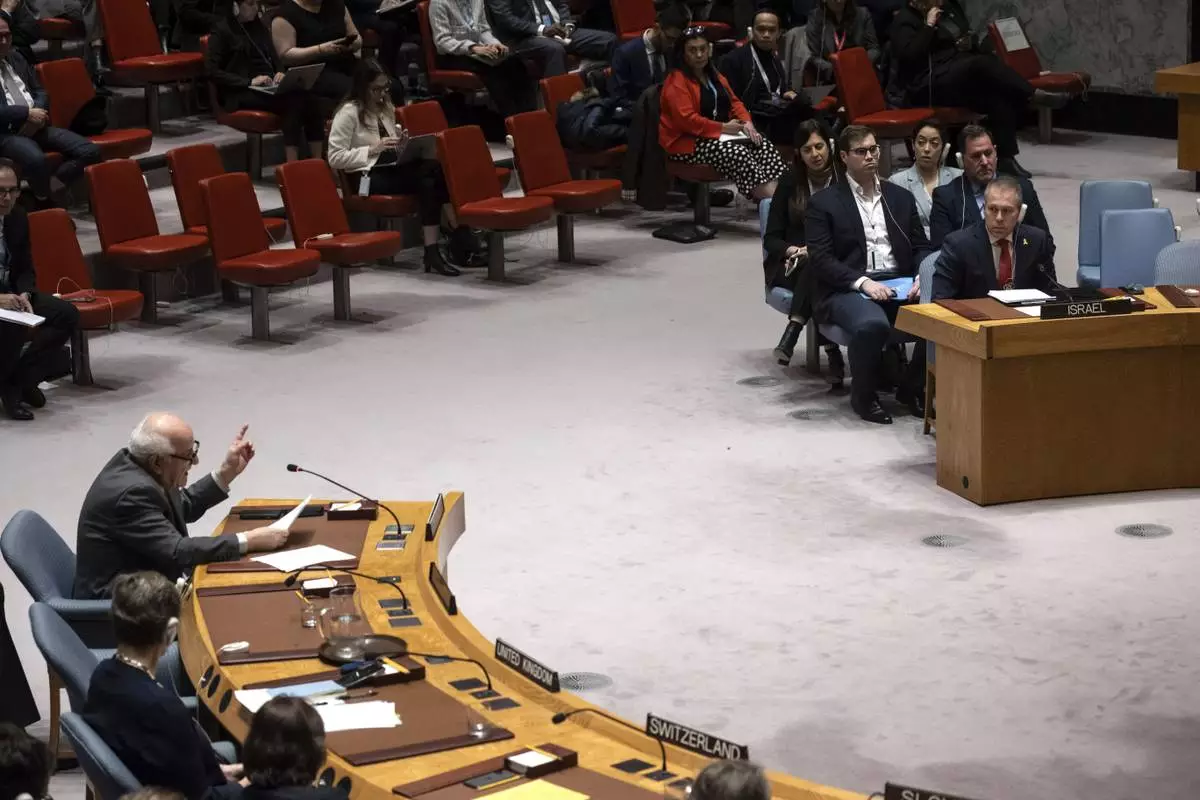
Palestinian Ambassador to the United Nations Riyad Mansour speaks during a Security Council meeting at United Nations headquarters, Thursday, April 18, 2024. (AP Photo/Yuki Iwamura)
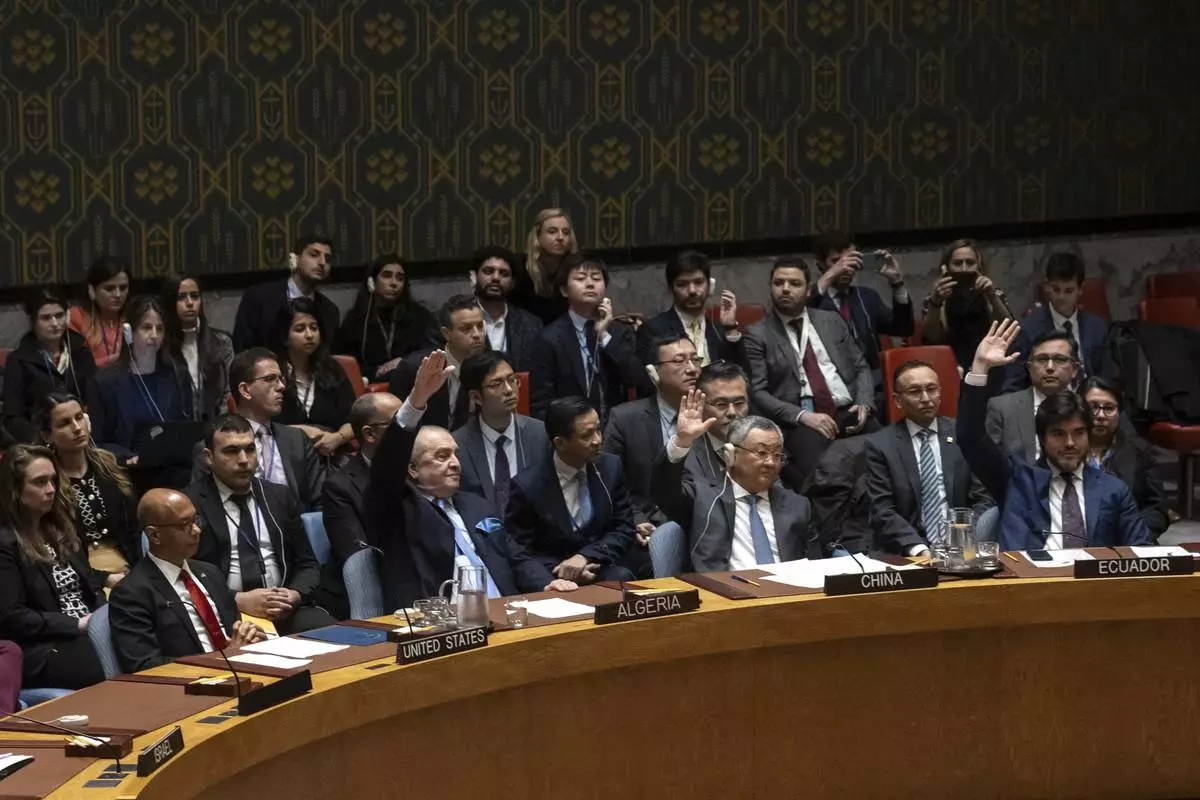
Representatives of member countries take votes during a Security Council meeting at United Nations headquarters, Thursday, April 18, 2024. (AP Photo/Yuki Iwamura)
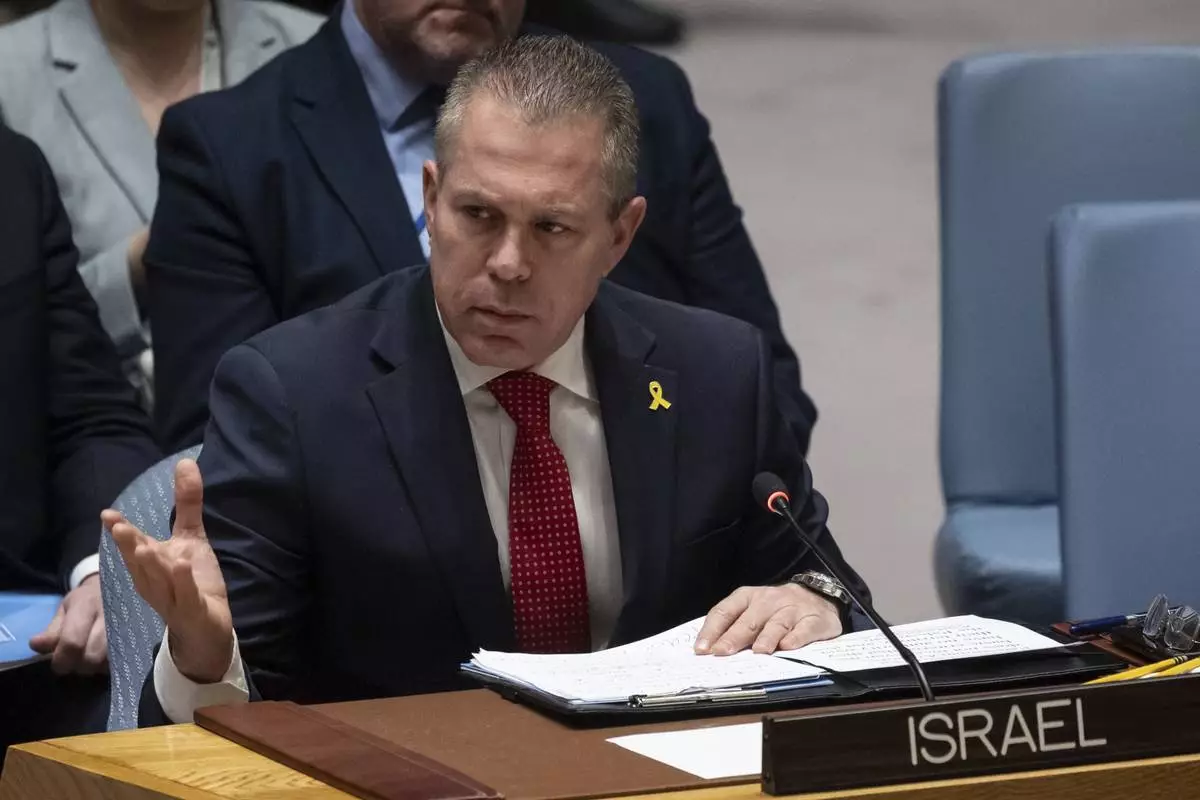
Israeli Ambassador to the United Nations Gilad Erdan speaks during a Security Council meeting at United Nations headquarters, Thursday, April 18, 2024. (AP Photo/Yuki Iwamura)
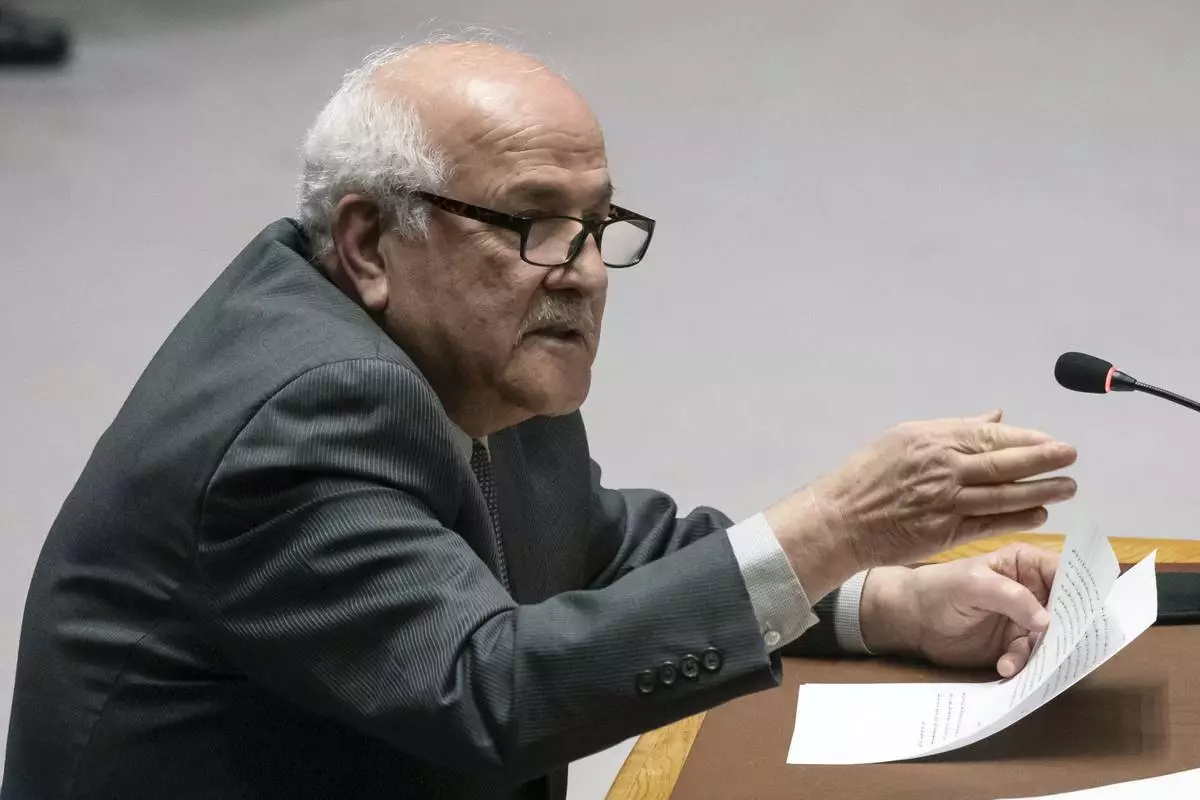
Palestinian Ambassador to the United Nations Riyad Mansour speaks during a Security Council meeting at United Nations headquarters, Thursday, April 18, 2024. (AP Photo/Yuki Iwamura)
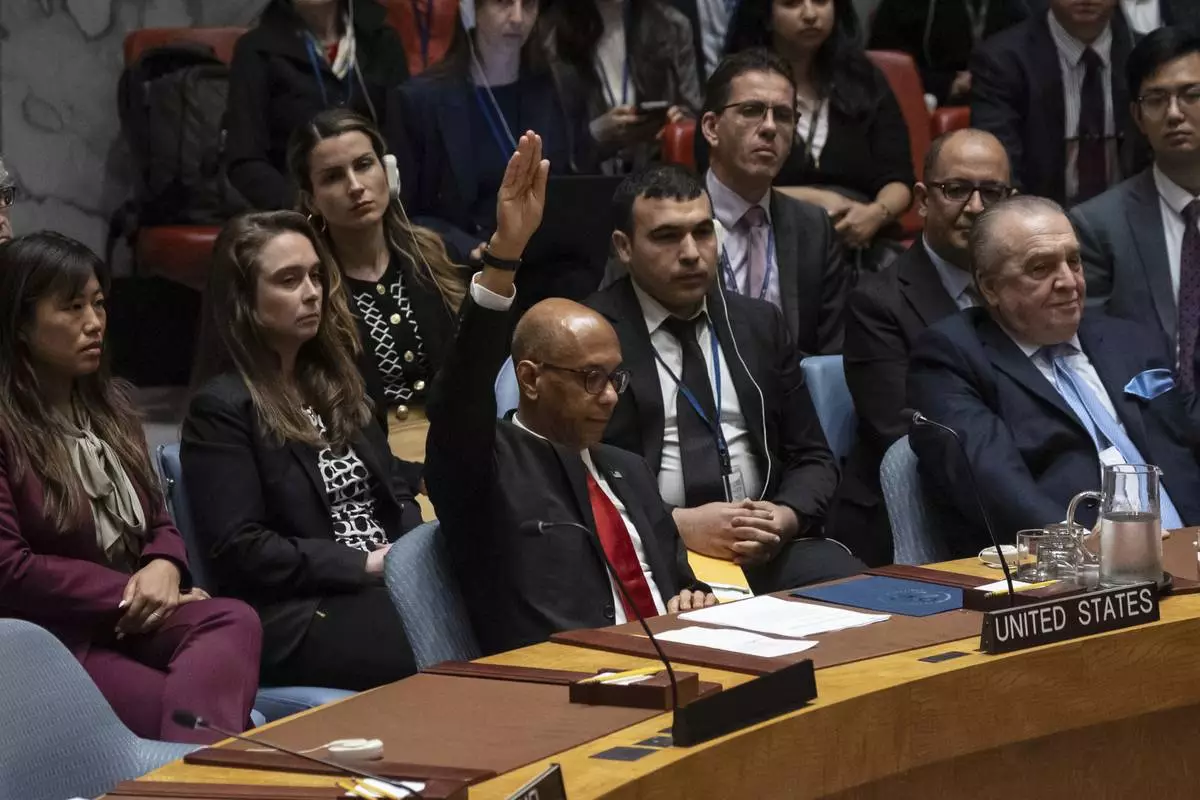
U.S. Deputy Ambassador Robert Wood votes against resolution during a Security Council meeting at United Nations headquarters, Thursday, April 18, 2024. (AP Photo/Yuki Iwamura)




















